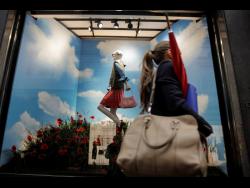A slew of luxury brands will remain separate entities for now.
On Thursday, a judge blocked the merger of Tapestry and Capri Holdings, two companies that oversee a number of accessories brands, The Washington Post reported. The $8.5 billion merger was announced last year, but Judge Jennifer Rochon of the Southern District of New York has ruled that it would lead to higher prices for consumers.
The merger “likely will substantially lessen competition in the market for accessible-luxury handbags, in violation of Section 7 of the Clayton Act,” Rochon wrote.
Tapestry is the owner of labels including Coach, Stuart Weitzman, and Kate Spade, the Post noted. Capri, meanwhile, is home to brands such as Versace, Michael Kors, and Jimmy Choo. By combining the two companies, the merger would make them more competitive with major luxury conglomerates like LVMH and Kering. Plus, it would place them within the higher end of the luxury industry.
The Federal Trade Commission filed a lawsuit to block the merger in April, The Washington Post wrote, and the trial started in September. While Rochon has effectively blocked the merger for now, the case will continue in the FTC’s in-house administrative court, and a Tapestry spokesperson told the newspaper that the company plans to appeal the decision.
“Tapestry and Capri operate in an industry that is intensely competitive and dynamic, constantly expanding, and highly fragmented among both established players and new entrants,” the spokesperson said. “We face competitive pressures from both lower- and higher-priced products and continue to believe this transaction is pro-competitive and pro-consumer.”
If the merger were to eventually go through, the combined Tapestry and Capri would control a whopping 59 percent of the “accessible luxury” handbag market, Rochon wrote in her decision. Following that decision, shares in Capri plummeted 51 percent, while shares in Tapestry rose more than 12 percent.
The two brands exist within a luxury market that has largely slowed down in the past few months, with many companies releasing poor sales and profit results. They aren’t immune to that trend either: Revenue at Capri fell 13.2 percent year over year in August, the Post noted. Revenue at Tapestry did rise 1 percent year over year thanks to Coach’s strong performance, but sales at Stuart Weitzman dropped 19.2 percent in that same time period.
This post was originally published on this site be sure to check out more of their content.



